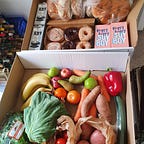Pay for products, not packaging
Re-use is a better way to reduce your footprint than recycling
Recycling isn’t enough to stop climate change. It’s a token effort and unfortunately a lot of the packaging we buy isn’t recycled.
Currently less than half the UK’s household waste is recycled with 70 per cent of packaging materials going in recycling bins. While councils and charities continue to promote more recycling, brands are starting to acknowledge the need to reduce packaging, particularly plastic.
Many products are packaged in 100% recycled and recyclable materials but ultimately this isn’t enough — we need to look at the impact of the goods we consume and buy alternatives to plastic covered products.
Zero-waste refill shops are popping up around the country — you fill an empty jar, bottle or paper bag with your goods and you pay for the contents not the packaging.
Filling and re-filling your own packaging isn’t as convenient as picking up pristine packaged products at your local supermarket or corner shop but it is a great way to reduce your footprint.
If you don’t have a zero-waste shop nearby, there are things you can do…
Take a bag when you go shopping
Not to mention the small charge for a plastic bag, keep cloth ones in your coat pockets and bags — they’re stronger and you can use them again and again.
Consider a rucksack or trolley bag for a big shop, it’s a good workout and you’ll be surprised how much you can carry.
Buy things with minimal or non-plastic packaging
You can avoid plastic-wrapped products in favour of those in card, metal or glass, which are less impactful on the environment to reduce and recycle.
Order (plant-based or dairy) milk delivered in reusable glass bottles or cartons, use bars of soap instead of liquid products in plastic bottles, cardboard tubes of crisps instead of plastic packets, foil-wrapped blocks of margarine and tinned foods beat tubs.
Bulk-buy
Dried foods like rice, pasta, herbs, spices tea, coffee and flour, have long shelf-lives and are better value in bigger quantities.
A good example are small 20g glass and plastic jars of herbs sold at supermarkets. For a little more money, you can buy bigger pouches at continental food stores or online plastic-free packets. Simply re-use and refill jars rather than throwing them away and paying a premium for a little jar.
Make your own meals
Lockdown has allowed us more time at home to cook. Ready meals and snacks can generate extra packaging especially plastic which is convenient for manufacturers and retailers but terrible for the planet.
If you can make something from scratch, try it. You’ll learn new skills and you can tweak recipes to your taste knowing exactly what’s gone into your food.
Pasta, dumplings and pizza are easy to order in but good fun and surprisingly easy to make and customise. Buying produce without packaging means you get as much you need and can choose the size and ripeness of your greens.
Beware ‘compostable’ labels on single-use items
Plastics can take 1,000 years to break down. Many ‘compostable’ coffee cups, lids and cutlery are made from plant-based plastic. It can degrade quicker but is often only suitable for industrial compost via council food caddy collections. It won’t break down easily in a garden compost bin and in any case, they often end up in litter bins which go to landfill. The best solution is a reusable cup, lunchbox and cutlery, if you can remember to take them with you.
Recycle plastic wrap and film at larger supermarkets
Bread bags, film lids on fresh produce, crisp and snack bags are examples of packaging that can’t be recycled at home.
Larger supermarkets are now offering customers the chance to recycle plastic bags and wrapping that can’t be collected from council bins. It’s often hidden near the exits but worth doing to ensure waste can be recycled.
Ideally, we’d not need to use this but it at least shows retailers and manufacturers considering the impact of plastic packaging.
